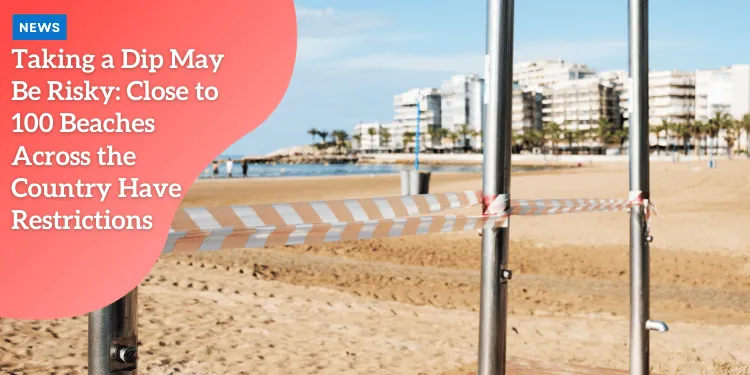Taking a Dip May Be Risky: Close to 100 Beaches Across the Country Have Restrictions

Introduction: The Impact of Bacterial Contamination on Beaches
As the Fourth of July holiday approaches, many Americans eagerly anticipate spending time at the beach, enjoying the warmth of the sun, and cooling off in the water.
Anúncios
However, this year, the excitement of beachgoers is being dampened by growing concerns over water quality.
Several states across the nation have issued warnings and even closed beaches due to high levels of bacteria in the water, which poses serious health risks.
The issue of bacterial contamination is not new, but it is becoming increasingly prevalent, with significant consequences for public health, especially during the busy summer months.
Anúncios
As beaches are a popular destination for families, tourists, and locals alike, the widespread beach closures serve as a reminder of the ongoing environmental challenges that affect the quality of natural spaces and the well-being of those who enjoy them.
Sources of Contamination and Their Impact on Public Health
The problem of bacterial contamination in water is often associated with fecal waste, which can come from various sources, including human and animal waste.
Another major concern is the presence of cyanobacteria, which are commonly referred to as blue-green algae.
Anúncios
These microorganisms can flourish in warm, nutrient-rich waters, creating what are known as harmful algal blooms (HABs).
The blooms can produce toxins that are harmful to humans, animals, and the environment.
In the days leading up to the Fourth of July, authorities in at least 10 states have taken precautionary measures to protect public health by closing beaches and issuing advisories.
The severity of the contamination is causing concern across a wide geographic area, affecting several states from the east to the west coast, including Florida, Illinois, Michigan, New Jersey, New York, and Vermont.
Concerns in Florida, Illinois, and Michigan
In Florida, for example, officials have reported unsafe water quality at numerous beaches due to the presence of high levels of enterococci, a type of bacteria found in fecal waste.
The Department of Health has identified several beaches in Monroe and Hillsborough counties that have failed to meet safe water quality standards.
Florida’s warm climate and its numerous coastal areas make the state particularly vulnerable to water contamination, especially during the summer months when beach traffic peaks.
Enterococci is an indicator of fecal contamination, which can lead to a variety of illnesses, including gastrointestinal infections, skin rashes, and respiratory issues.
The state of Illinois has also been grappling with water contamination issues.
Over the past week, the Illinois Department of Public Health has issued advisories for 16 beaches, warning the public about the presence of harmful bacteria.
Beaches along Lake Michigan have been especially affected, with high levels of fecal bacteria detected in the water.
The state’s environmental agencies continue to monitor water quality at popular beach destinations in an effort to prevent any outbreaks of waterborne diseases.
In Michigan, two beaches have been closed entirely due to bacterial contamination, and five additional beaches have been issued swimming advisories.
The closures and advisories in these states are a stark reminder of the challenges faced by beach communities in maintaining clean and safe water for the public.
Other Affected States: New Jersey, New York, and Vermont
Other states, such as New Jersey, New York, and Vermont, are also experiencing similar issues with bacterial contamination.
In New Jersey, several beaches along the Atlantic coastline have been flagged for high bacteria levels, which are particularly concerning given the large number of beachgoers that visit these areas during the summer.
New York State has been grappling with high levels of both fecal bacteria and cyanobacteria, which have prompted officials to issue warnings for several beaches in the state.
In Vermont, cyanobacteria have become a major problem, especially in the state’s freshwater lakes.
At least six locations are on high alert due to excessive amounts of blue-green algae, and state health authorities have advised against swimming in these areas to prevent exposure to potentially harmful toxins.
Environmental Impact and Health Risks Posed by Cyanobacteria
The environmental impact of bacterial contamination extends beyond just public health concerns.
Harmful algal blooms, driven by excessive nutrient pollution, can deplete oxygen levels in the water, harming aquatic life and disrupting entire ecosystems.
In many cases, these blooms can lead to fish kills, making local waters unsafe for both humans and wildlife.
Moreover, cyanobacteria produce microcystin, a potent toxin that can have severe health effects on humans and animals.
If ingested or absorbed through the skin, microcystin can cause liver damage, kidney failure, and even death in extreme cases.
These toxins are not only dangerous to those who come into contact with contaminated water but can also affect the surrounding environment, including the air and soil.
Climate Change and the Increase in Algal Blooms
Research has shown that climate change is exacerbating the frequency and severity of cyanobacterial blooms.
Rising temperatures, increased rainfall, and changing weather patterns create ideal conditions for the proliferation of these harmful algae.
As a result, the risk of exposure to waterborne toxins is expected to increase, creating a growing public health threat.
For example, in Iowa, high levels of microcystin have been detected at two beaches, while elevated levels of E. coli have been found at five other locations.
The combination of these pollutants poses a serious threat to swimmers and other individuals who frequent these areas.
Impact on Tourism and Local Economies
The impact of bacterial contamination is not limited to public health; it also affects the tourism industry, which relies heavily on the popularity of clean and safe beaches.
In Massachusetts, the Department of Public Health has reported a significant number of beach closures due to high bacteria levels.
In fact, 34 beaches have been closed temporarily, mainly because of high concentrations of E. coli or enterococci, which are both indicators of fecal contamination.
E. coli is typically found in freshwater environments, while enterococci is more commonly found in saltwater.
According to Robert Goldstein, commissioner of Massachusetts’ Department of Public Health, bacterial levels tend to spike after heavy rainfall, as rainwater washes pollutants such as animal waste and debris into the water.
While beach closures are common after storms, Goldstein notes that they are generally short-lived, and the state’s beaches remain open the majority of the time.
However, during periods of heavy contamination, closures can have significant economic consequences for beach towns that rely on tourism to support local businesses.
Monitoring and Preventive Actions by Beachgoers
To mitigate the risk of water contamination, beachgoers themselves can take simple yet effective actions.
One of the most important steps individuals can take is to clean up after pets and dispose of waste properly.
Animal feces can contribute significantly to bacterial contamination, so picking up after pets is essential in preventing pollutants from entering the water.
In addition, properly disposing of trash and debris can prevent litter from accumulating on the beach and ultimately making its way into the water.
By taking these small actions, beachgoers can help reduce the overall environmental impact and contribute to maintaining cleaner, safer beaches for everyone.
Conclusion: Vigilance and Responsibility for a Safe Summer
In conclusion, as the summer season progresses and the Fourth of July holiday approaches, vigilance and responsibility are crucial for ensuring that beach outings remain safe and enjoyable.
The recent wave of beach closures and advisories highlights the importance of ongoing monitoring and proactive measures to safeguard public health.
Staying informed about water quality, adhering to safety guidelines, and taking preventive actions can help mitigate the risks associated with bacterial contamination.
As more people become aware of the impact of their actions on the environment, it is hoped that the frequency of harmful bacterial contamination will decrease, leading to safer swimming conditions and healthier communities.
Ultimately, the collective effort to maintain clean and safe beaches reflects a shared commitment to both public health and environmental stewardship.





